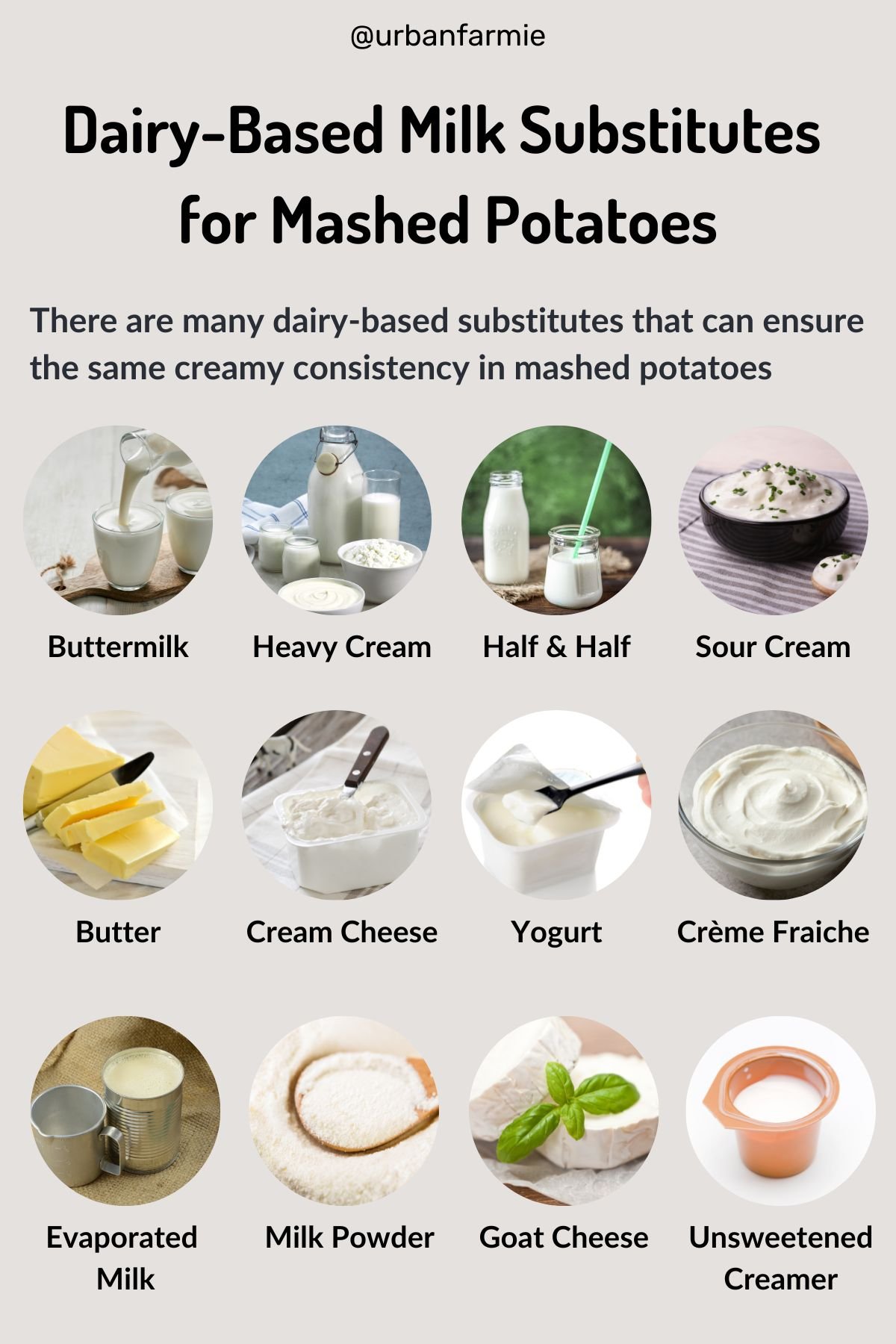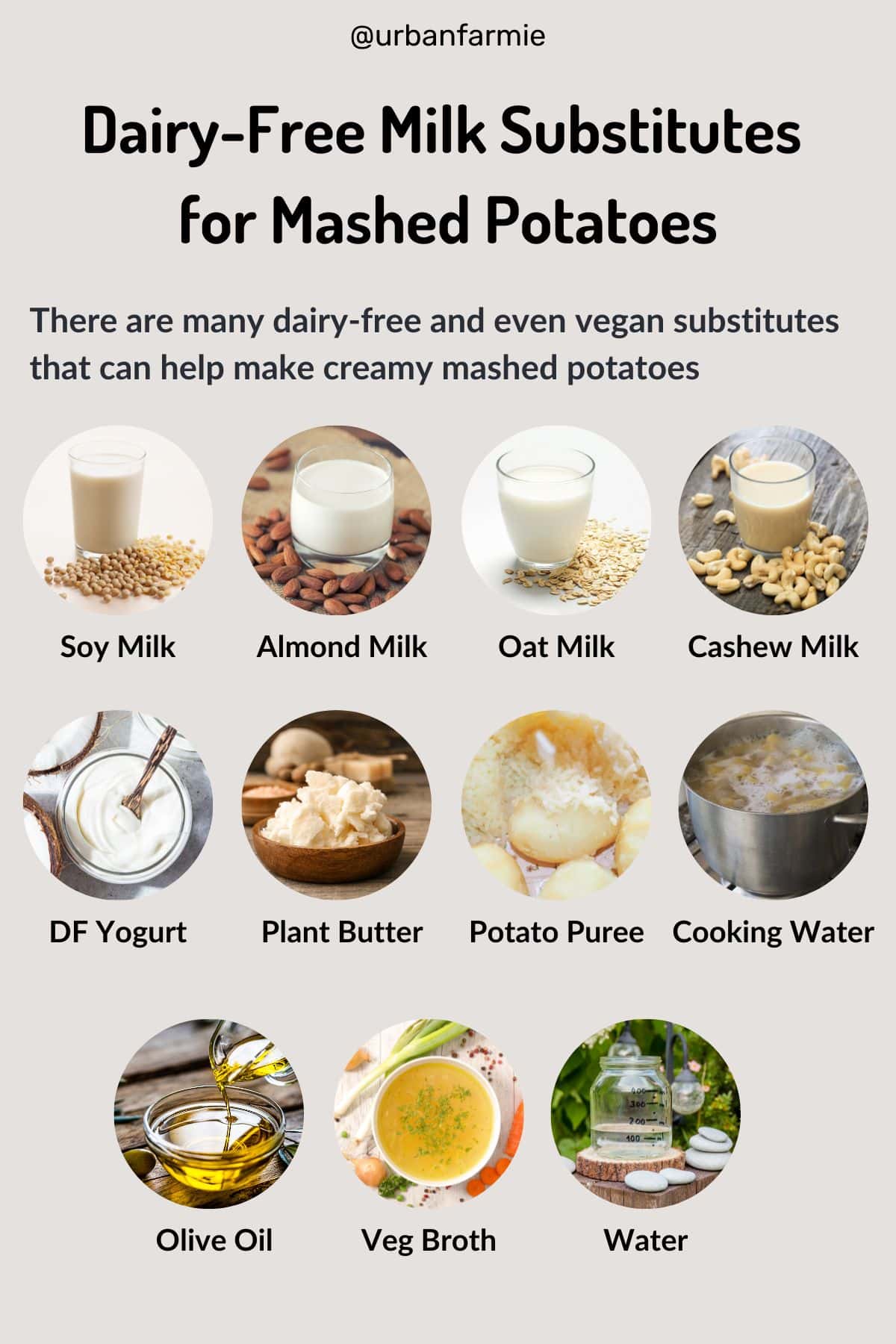Classic mashed potatoes recipes typically use milk to develop a creamy texture and great flavor. However, if you are on a dairy-free or vegan diet, don't have any milk on hand, or simply don't want to use milk, don't worry! Read on to find out more about common substitutes for milk in mashed potatoes, ratios for substitution, and things to keep in mind while using these in place of milk.

Why use a milk substitute?
Whether you've just run out of milk (hey, it happens to the best of us!) or have dietary restrictions or health reasons that don't allow you to consume dairy products, there are many reasons why you may want to swap out milk in your mashed potatoes.
What is the role of milk in mashed potatoes?
Before we jump into looking at substitutes, it's important to understand the role that milk plays in developing delicious mashed potatoes. In fact, it plays three key roles in any mashed potato recipe.
- Flavor: Milk is often considered essential for mashed potatoes, since it adds extra flavor and a bit of extra richness to mashed potatoes.
- Moisture: Milk adds moisture to mashed potatoes, but too much milk can actually make them watery.
- Fat: The fat in milk adds quite a bit of creaminess to mashed potatoes (which is why it's often better to use whole milk versus skim milk!)
However, you can make perfectly creamy, delicious, and rich mashed potatoes with or without milk. Want a traditional version? Check out my cheesy mashed potatoes, or this Instant Pot no-drain mashed potatoes (can be made vegan!) Have leftovers? Check out these incredible uses for leftover mashed potatoes.
Things to be aware of while substituting milk in mashed potatoes
Given the importance of milk, talk about some things you must be aware of when you are planning to substitute milk in mashed potatoes:
- The type of milk substitute you use can impact the flavor and consistency of your mashed potatoes. For example, buttermilk will be similar to whole milk, and make for a richer mashed potato dish. Many plant-based milks are similar to skim milk, and will result in a lighter dish.
- If you're substituting cream for milk, the fat content in the cream will impact the final dish. You may need to adjust other ingredients, such as the amount of butter, accordingly.
- When substituting buttermilk for milk, keep in mind that buttermilk is more acidic than milk. This acidity can impact the flavor of your mashed potatoes, so you may need to add a bit more salt to balance out the flavors.
My favorite milk substitutes for mashed potatoes
I typically tend to use buttermilk in lieu of milk while making mashed potatoes because it lends a much creamier, tangier consistency (without being as heavy or indulgent as sour cream). If you're looking for a fantastic mashed potato recipe with three cheeses, check out these cheesy mashed potatoes.
Common milk substitutes

Buttermilk
Buttermilk is a great substitute that is also tangy (and as I said before, my favorite substitute for milk in mashed potatoes!) The acidity of buttermilk helps to break down the potatoes, making them extra creamy. I do often add a little extra flavoring, like garlic, to balance out the mildly sour flavor if you're used to a more classic mashed potato flavor.
Ratio: The ratio of buttermilk is usually in equal parts to the amount of milk. So, if a mashed potato recipe calls for one cup of milk, you would use one cup of buttermilk.
Heavy cream
Heavy cream is an excellent substitute for milk in mashed potatoes. It is higher in fat than milk, which can make your mashed potatoes richer and creamier. It's thicker than milk, so it can also help to thicken your mashed potatoes.
Ratio: When substituting heavy cream for milk, use a ratio of 1:1 or ¾ cup heavy cream with ¼ cup of water for every cup of milk.
Half and half
Another great milk substitute is half-and-half. Your cooked mashed potatoes would taste amazing and have a thick, creamy consistency.
Ratio: Use 1:1 half and half in place of milk in mashed potatoes.
Sour cream
Sour cream is a great substitute but the resulting flavor of mashed potatoes from using sour cream is more tangy, and the texture is more rich and creamy. Although its flavor is different from milk in mashed potatoes, the texture is quite similar.
Ratio: Use a 1:1 ratio for sour cream (i.e., a cup of milk would be equivalent to a cup of sour cream). .
Butter
Butter is another common substitute for milk in mashed potatoes because it is rich and creamy. The butter gives the mashed potatoes a smooth fluffy texture and a rich flavor.
Ratio: The ratio of butter to milk in mashed potatoes is usually about half cup butter to one cup milk. This ratio can be adjusted depending on the desired texture and flavor of the mashed potatoes.
Cream cheese
If you run out of milk you can try cream cheese. The flavor is similar to that of milk, but it is not as sweet. The creaminess of cream cheese makes it a good substitute for milk in mashed potatoes.
Ratio: I typically suggest starting with a half cup of cream cheese in place of a cup of milk, as a replacement for milk in mashed potatoes. However, you can go up to as much as a 1:1 ratio depending on your flavor preference.
Yogurt or Greek Yogurt
Yogurt or Greek yogurt can be a great (healthy!) option if you run out of milk for mashed potatoes. This will add a slightly tangy flavor, and the consistency is also thicker than milk; therefore, less may be required to achieve the desired consistency of mashed potatoes.
Ratio: The ratio for substitution is generally in equal parts, i.e., one cup of yogurt or Greek yogurt (or even vegan yogurt) in place of one cup of milk.
Crème Fraiche
Crème Fraiche is a thick, creamy, slightly sour dairy-based cream. It has a rich, nutty flavor. Crème fraiche adds a tanginess to the dish that milk does not. While substituting crème fraiche for milk in mashed potato, it's sometimes recommended to first microwave it in 30 second intervals until it is slightly melted, so it's easier to whisk it in the mashed potatoes.
Ratio: The suggested ratio of Crème Fraiche to milk in mashed potatoes is about equal parts as well.
Evaporated Milk
Evaporated milk is usually found in cans or cartons at the supermarket. It's made by evaporating water from milk until it becomes about 60 percent of its original volume. This milk is commonly used as a substitute for milk in mashed potatoes.
The main difference between evaporated milk and regular milk is the flavor. Evaporated milk has a more intense, slightly sweet flavor. It's also thicker and less watery than regular milk.
Ratio: The ratio of evaporated milk to regular milk is usually one to one. So, if a recipe calls for one cup of milk, you would use one cup of evaporated milk.
Mayonnaise
Mayonnaise is another great (and potentially non-dairy) substitute for milk in mashed potatoes. It is typically made from eggs or canola oil, and has a rich, creamy texture. Mayonnaise is also a good source of fat and protein and can add flavor to your mashed potatoes. Mayonnaise will also add a tangy flavor to your mashed potatoes so you must add it according to your taste.
Ratio: When substituting mayonnaise for milk in mashed potatoes, use a ratio of 2 tablespoons of mayonnaise to one cup of milk. You may need to add more Mayonnaise to achieve the desired consistency.
Milk Powder
Milk powder is another thing you can substitute in place of milk in mashed potatoes. It is a dried form of milk that has had the water content removed. It's shelf-stable and can be found in most grocery stores in the baking aisle. Milk powder is reconstituted with water before use and has a slightly different flavor than milk.
Milk powder doesn't have the same fat content as milk, so your mashed potatoes might not be as rich and creamy. But, milk powder is a good option if you're out of milk and need a quick substitute.
Ratio: The ratio for substituting milk powder in place of milk is 1 tablespoon of milk powder to every ¼ cup of water is equal to a ¼ cup of milk.
Soft Cheese / Spreadable Cheese
Any cheese that can be milled or stirred into a smooth, creamy consistency can be used as a milk substitute in mashed potatoes. Soft cheese, also known as spreadable cheese, has lower fat content than most other cheeses, making it a healthier option.
You should be aware that this substitution might affect the flavor of your mashed potatoes. Soft cheese has a milder, creamier flavor than milk, so it won't add as much depth of flavor to your dish. You might want to add extra seasoning to compensate.
Ratio: When substituting soft cheese for milk, use a ratio of one part cheese to two parts water. For example, if you're using one cup of soft cheese, add two cups of water. This will help to thin out the cheese and make it easier to mash.
Unsweetened Creamer
Another good substitute for milk in mashed potatoes is unsweetened creamer. Just make sure the creamer you use is unsweetened so that your mashed tomato will not become too much sweet. This substitution will surely make your mashed potato richer and creamier.
Ratio: We suggest using a ratio of 0.5:1 when using unsweetened creamer in place of milk in mashed potatoes, meaning, half cup of creamer is equivalent to one cup of milk.
Dairy-free and vegan milk substitutes
If you're looking for a good dairy-free milk substitute option for mashed potatoes (for instance, if you're vegan or lactose intolerant) - we've rounded up the best non-dairy substitutes.

Non-Dairy Milk
Non-dairy milk is a great substitute substitute for milk in mashed potatoes because it is lower in fat and calories than milk. However, different types of non-dairy milk have different characteristics. Here are some of the non-dairy milk that can be substituted in place of milk in mashed potatoes.
- Almond Milk: Almond milk is a popular non-dairy milk alternative made from finely ground almonds and water. Its creamy, nutty flavor makes it a good choice for baking and cooking. Almond milk is perfect for people that have lactose intolerance or are vegan. The ratio of almond milk to mashed potatoes is one to one.
- Soy Milk: Soy milk is a good substitute for milk in mashed potatoes. It is made from soybeans and has a similar consistency to cow's milk. Soy milk is a good source of protein and is lower in fat than milk. The ratio for soy milk to mashed potatoes is one cup of soy milk to every one cup of milk.
- Oat Milk: Oat milk is a type of none dairy option made from oatmeal. It has a creamy, oaty flavor and is rich in vitamins and minerals. Unlike almond and soy milk, oat milk is plant-based. You may use a 1:1 ratio for oat milk instead of ordinary milk in many cases. Oat milk prevents your mashed potatoes from becoming watery and runny.
- Cashew Milk: Cashew milk is made from cashew nuts that have been soaked and blended with water. It has a creamy, nutty flavor which can make your mashed potato smoother and creamier. Please always take note that cashew milk might make your mashed potatoes watery so you must use a little less than you think you'll need.
- Hemp Milk: Hemp milk is a good source of protein and essential fatty acids, both of which are important for a healthy diet. It is also a good source of calcium, and is free of cholesterol and saturated fat, making it a healthier option than whole milk. The ratio of hemp milk to mashed potatoes is, for every cup of hemp milk, use two cups of mashed potatoes. This will ensure that your mashed potatoes are creamy and delicious.
Dairy-Free Yogurt
Dairy-Free Yogurt is a great substitute for milk in mashed potatoes. The ratio of Dairy-Free Yogurt to milk is about equal, so you can use the same amount of Dairy-Free Yogurt as you would milk. Dairy-Free Yogurt is also a good source of calcium and protein, so it's a healthy choice for mashed potatoes. Dairy-Free Yogurt is available in many different flavors, so you can find one that you really like.
Plant Butter
Plant butter is a vegan butter made from plants, and it's a great substitute for milk in mashed potatoes. It is high in healthy fats and has a creamy texture that makes it perfect for mashed potatoes. The ratio of Plant Butter to milk in mashed potatoes is 1:1. So if you're looking to cut down on dairy, Plant Butter is a great choice.
Potato Puree
Potato puree is a great substitute for milk in mashed potatoes. It is made from boiled potatoes that have been blended or mashed. This makes it a thick and creamy puree that is perfect for adding to mashed potatoes. Potato puree is also a good source of vitamins and minerals, so it's a healthy choice for your mashed potatoes. When using potato puree, be sure to add extra seasoning to your mashed potatoes to give them flavor. The ratio of potato puree to milk is about equal, so use the same amount of potato puree as you would milk.
Residual Potato Cooking Water
Residual potato cooking water is the water that is left over after boiling potatoes. This water is full of nutrients and flavor, making it a great substitute for milk in mashed potatoes. Residual potato cooking water will make your mashed potatoes more nutritious and flavorful, so it's the best way to boost the healthfulness of your favorite comfort food. The amount of residual potato cooking water to milk is up to you, but we recommend using a 0.5:1 ratio of potato cooking water to milk.
Olive Oil
Olive oil is a good substitute for milk in mashed potatoes. It is healthy and has a neutral taste that will not alter the unique flavor of your dish but using a lot of this could make your mashed potatoes bland and a bit greasy. Although it is the best option, we recommend that you try other alternatives before using this one. The ratio of olive oil to mashed potatoes should be one tablespoon of olive oil for every cup of mashed potatoes.
Broth
Vegetable or chicken broth are also acceptable substitutes. To expand its taste and texture, you can add spices and sweeteners. Broth can make your mashed potatoes more watery, so be sure to add it slowly and in small amounts. If you don't have broth you can substitute chicken stock or vegetable stock in place of them. The substitution ratio for milk to broth is 1:1. This will ensure that your mashed potatoes still have the same creamy consistency, but with an extra savory flavor.
Water
Water is a great substitute for milk in mashed potatoes for a few reasons. First, water is calorie-free, so it's a great way to lighten up your mashed potatoes without sacrificing flavor. Second, water doesn't curdle like a milk can, so your mashed potatoes will be smooth and lump-free.
The substitution ratio for water is simple: just use equal parts water and milk. So, if your homemade mashed potatoes recipe calls for a cup of milk, use a cup of water instead.
FAQs
Usually, mashed potatoes are good for two to three days in the fridge—as long as they're properly stored, that is. If your mashed potatoes are starting to turn brown or grow mold, it's time to toss them. You can also store them in your freezer to have a longer shelf life that would take up to 12 months.
The answer is yes! Mashed potatoes can be frozen, and they actually freeze quite well. Just remember to thaw them out properly before reheating. Freezing mashed potatoes will increase their shelf life of it and be ready to use when you need them.
There are a few ways you can freeze mashed potatoes. One way is to portion them into freezer-safe bags or containers, and then simply thaw and reheat when you need them. Another way is to spread the mashed potatoes out onto a baking sheet, and then freeze them in individual servings. Once they’re frozen, you can transfer them to a freezer-safe bag or airtight container.
There are a few different ways that you can thicken mashed potatoes. You can add cornstarch, flour, or even Instant Potato Flakes. If you want to thicken your mashed potatoes without changing the flavor, you can add some cooked, pureed vegetables. This will also add some extra nutrients to your dish. Another way to thicken mashed potatoes is to cook them longer so that some of the water evaporates. This will make them creamier and more flavorful.
You can reheat your mashed potatoes one of two ways, in the microwave or on the stove. If you reheat them in the microwave, be sure to add a little bit of milk or cream to them before reheating in an oven at 350 degrees for 20 minutes, as this will help to prevent them from drying out. To reheat on the stove, simply add your mashed potatoes to a pot with a little bit of milk or cream and heat over low heat, stirring occasionally, until heated through.
There are a few different ways that you can keep your mashed potatoes warm. You can place them in a slow cooker on the warm setting or you can place them in an oven-safe dish and keep them warm in a preheated oven set to 200 degrees. If you're planning on serving the mashed potatoes within an hour or so, you can place them in a covered dish and set them over a pot of simmering water. This will help to keep the potatoes warm without making them mushy.










This info is so helpful! I saved your post so I can refer back to it for the holidays!